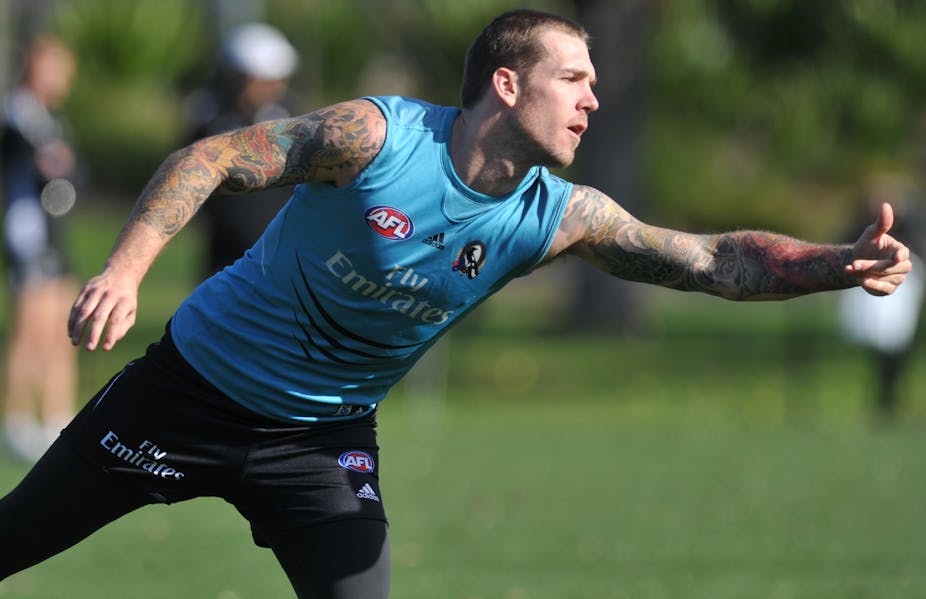Here we go again. Another high profile sportsperson has been implicated in the latest drugs in sport “scandal”.
This time the finger is being pointed at Collingwood Brownlow medallist Dane Swan. The same people who bayed for Ben Cousins’ blood are now calling for Swan to be sacked for alleged “bad behaviour”.
Collingwood chief executive Gary Pert has suggested that the drugs problem may be more widespread. He has described illicit drug use by players as the biggest issue in AFL.
So concerning is this matter for some in the AFL world, that there is a special AFL CEO’s meeting scheduled for January 2013 to examine the issue. It has been reported that some are already contemplating a stricter approach to more frequent drug testing of suspect players during the out-of-season holiday period.
Hopefully, wise heads will prevail in the reporting and debate that follows that meeting. But it is easy to be pessimistic considering the usual public responses we see around the drugs in sport issue – name, shame, punish, and demand tougher drug policies.
The image that ran with one piece on this issue in The Age yesterday was particularly unhelpful. Football field line markings in white powder on glass, complete with a rolled up $50 note ready to snort the lot. Come on.
Despite the negative stance of some commentators on this important issue, there are positive facts here that are worth highlighting.
In mid August, the British Journal of Sports Medicine published some of the outcomes data from seven years of the AFL Illicit Drug Policy since introduced in 2005. At the time it passed almost unnoticed. But the paper by Harcourt, Unglik and Cook revealed there had been:
No positive match day tests since 2005 (random and targeted).
A statistically significant reduction in positive tests for illicit drugs during non-competition periods from 19 (4% of 427 tests) in 2005 to six (0.4% of 1489 tests) in 2011.
The study authors concluded “the reduction in positive tests may be related to player education, the greater number of tests conducted and the harm minimisation approach of the illicit drug policy.”
The primary focus of the AFL illicit drug policy (IDP) is the health and welfare of players. In essence it is a “three strikes” policy. The first two positive drug tests of any player result in confidential counselling and treatment overseen by AFL medical officers. Financial and game time sanctions may occur if a player returns a third positive drug test.
The AFL stance on this issue hasn’t been one of denial, and it hasn’t sought to close ranks and ignore apparent problems as they are identified. Instead it has been remarkably proactive. Significantly, the AFL IDP is supported by the players themselves through the AFL Players Association, and is accompanied by a range of education measures.

The AFL IDP contrasts markedly with other World Anti Doping Authority-compliant “drugs in sport” policies where the main focus is upon individual sanctions. We have all witnessed the negative impact of the name, shame and punish approach for professional cycling recently.
In policy terms, the AFL’s approach is a world-leading example of a successful harm-reduction response to the drugs in sport issue. It deserves public support. However, like our drug policies and laws generally, the AFL IDP will never totally eradicate drug use amongst the players in or out of competition.
It is true that the current testing protocols may still have gaps that could be addressed through more stringent and more frequent drug testing. But there is no such thing as a perfect drug testing system. Even if every player were to be tested every day there would still be ways around the protocols. There would still be drug use in the AFL.
There are important messages that all communities must send about what is and is not acceptable drug use. The AFL is right to send a clear message that illicit drug use among players is unacceptable.
There is a real potential for health and other harms to individuals who choose to use drugs. But unfortunately the risk of harm from consuming a particular drug is often the least of a drug user’s problems. In the case of illicit drug use the worst impact on the person may actually come from the way the rest of us treat them.
Intense negative media and public scrutiny, financial and legal penalties, suspensions, loss of playing career and reputation are fine if you really believe drug users are bad people who will stop using when punished. But the reality is the punitive approach alone fails to reduce drug use and drug harm.
The AFL IDP example shows the positive results that can come through drug policies that create an environment where people with drug concerns can be offered health and welfare information and assistance privately and with dignity.
The name-shame-punish alternative will only lead to more people trying to beat the drug detection odds due to their fear of public ridicule as a bad person engaged in “bad behaviour”.

